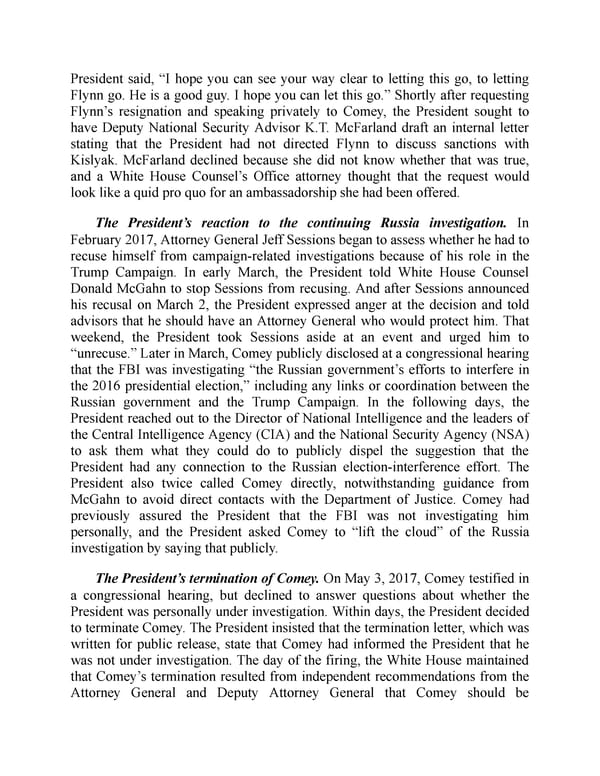President said, “I hope you can see your way clear to letting this go, to letting Flynn go. He is a good guy. I hope you can let this go.” Shortly after requesting Flynn’s resignation and speaking privately to Comey, the President sought to have Deputy National Security Advisor K.T. McFarland draft an internal letter stating that the President had not directed Flynn to discuss sanctions with Kislyak. McFarland declined because she did not know whether that was true, and a White House Counsel’s Office attorney thought that the request would look like a quid pro quo for an ambassadorship she had been offered. The President’s reaction to the continuing Russia investigation. In February 2017, Attorney General Jeff Sessions began to assess whether he had to recuse himself from campaign-related investigations because of his role in the Trump Campaign. In early March, the President told White House Counsel Donald McGahn to stop Sessions from recusing. And after Sessions announced his recusal on March 2, the President expressed anger at the decision and told advisors that he should have an Attorney General who would protect him. That weekend, the President took Sessions aside at an event and urged him to “unrecuse.” Later in March, Comey publicly disclosed at a congressional hearing that the FBI was investigating “the Russian government’s efforts to interfere in the 2016 presidential election,” including any links or coordination between the Russian government and the Trump Campaign. In the following days, the President reached out to the Director of National Intelligence and the leaders of the Central Intelligence Agency (CIA) and the National Security Agency (NSA) to ask them what they could do to publicly dispel the suggestion that the President had any connection to the Russian election-interference effort. The President also twice called Comey directly, notwithstanding guidance from McGahn to avoid direct contacts with the Department of Justice. Comey had previously assured the President that the FBI was not investigating him personally, and the President asked Comey to “lift the cloud” of the Russia investigation by saying that publicly. The President’s termination of Comey. On May 3, 2017, Comey testified in a congressional hearing, but declined to answer questions about whether the President was personally under investigation. Within days, the President decided to terminate Comey. The President insisted that the termination letter, which was written for public release, state that Comey had informed the President that he was not under investigation. The day of the firing, the White House maintained that Comey’s termination resulted from independent recommendations from the Attorney General and Deputy Attorney General that Comey should be
 Mueller Report PDF Page 276 Page 278
Mueller Report PDF Page 276 Page 278